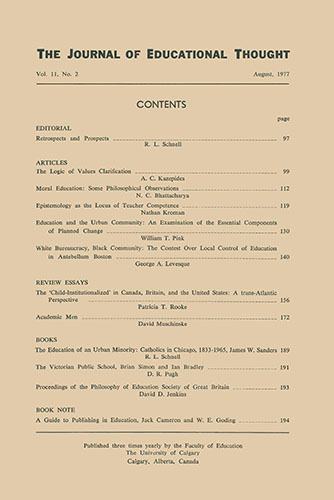White Bureaucracy, Black Community: The Contest Over Local Control of Education In Antebellum Boston
DOI:
https://doi.org/10.55016/ojs/jet.v11i2.43745Abstract
In 1855 the Commonwealth of Massachusetts became the first American State to officially desegregate its public school system. That development (which the U.S. Supreme Court was to cite as a precedent for its landmark: Brown vs. the Board of Education decision of 1954) was principally brought about by the efforts of black community leaders who, in tandem with leading white abolitionists, had begun to attack the city's separate school establishment in the early 1840's. The desegregation effort which culminated in the abolition of separate schools in the State in 1855 has been examined by a good number of scholars. Surprisingly, the ESTABLISHMENT of the separate school system in the state's capital city has never been told. In the years preceding the outbreak of the American Civil War, Boston's Negro population was the largest of any city in the Bay State. This paper describes how and when the separate schools in the city were organized, and the role of blacks themselves in establishing the system of segregated education in the first instance. The account begins at the turn of the century; by the 1840's, when America was swept by its first great Age of Reform, separatism was infefensible on two grounds, principally: it vitiated the propaganda efforts of those seeking to abolish slavery in America and, two, it gave whites a justification to perpetuate caste. But for a full half century Blacks in Boston were educated separately; these forgotten years are narrated in this article.
Downloads
Published
Issue
Section
License
The Journal of Educational Thought retains first publication rights for all articles. The Journal grants reproduction rights for noncommercial educational purposes with the provision that full acknowledgement of the work’s source be noted on each copy. The Journal will redirect to the appropriate authors any inquiries for further commercial publication of individual articles. All authors wishing to publish in JET will be asked to fill in and sign a Consent to Publish and Transfer of Copyright agreement.
Authors must affirm that any submission to JET has not been and will not be published or submitted elsewhere while under considration by JET.

